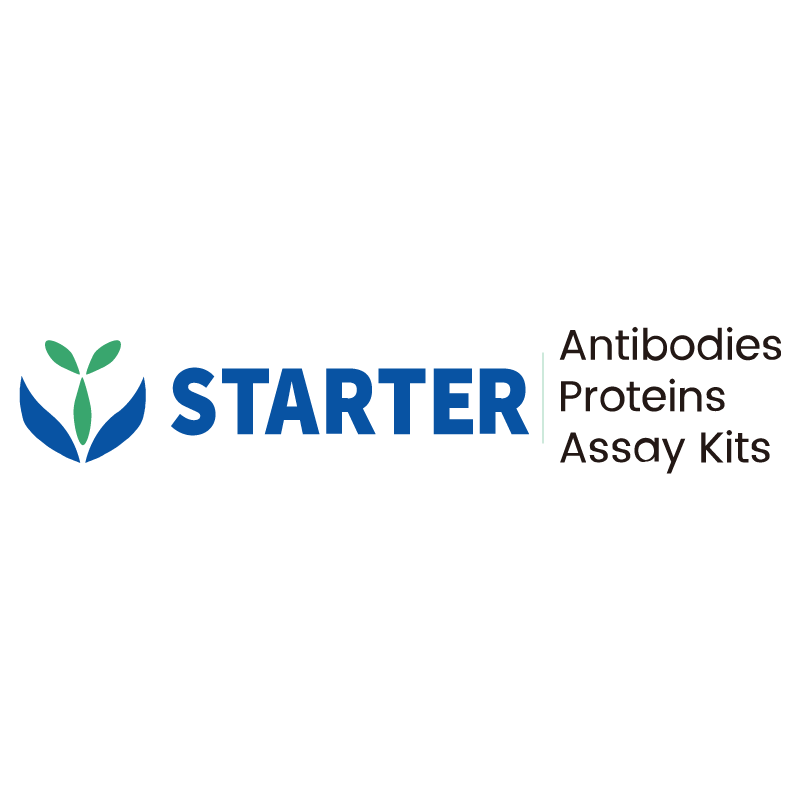WB result of Aiolos/IKZF3 Recombinant Rabbit mAb
Primary antibody: Aiolos/IKZF3 Recombinant Rabbit mAb at 1/1000 dilution
Lane 1: U-937 whole cell lysate 20 µg
Lane 2: Raji whole cell lysate 20 µg
Lane 3: Ramos whole cell lysate 20 µg
Lane 4: Daudi whole cell lysate 20 µg
Negative control: U-937 whole cell lysate
Secondary antibody: Goat Anti-rabbit IgG, (H+L), HRP conjugated at 1/10000 dilution
Predicted MW: 58 kDa
Observed MW: 45, 55, 65 kDa
Product Details
Product Details
Product Specification
| Host | Rabbit |
| Antigen | AiolosI/KZF3 |
| Synonyms | Zinc finger protein Aiolos; Ikaros family zinc finger protein 3; ZNFN1A3 |
| Immunogen | Synthetic Peptide |
| Location | Cytoplasm, Nucleus |
| Accession | Q9UKT9 |
| Clone Number | S-1268-42 |
| Antibody Type | Recombinant mAb |
| Isotype | IgG |
| Application | WB, IHC-P |
| Reactivity | Hu |
| Positive Sample | Raji, Ramos, Daudi |
| Purification | Protein A |
| Concentration | 0.5 mg/ml |
| Conjugation | Unconjugated |
| Physical Appearance | Liquid |
| Storage Buffer | PBS, 40% Glycerol, 0.05% BSA, 0.03% Proclin 300 |
| Stability & Storage | 12 months from date of receipt / reconstitution, -20 °C as supplied |
Dilution
| application | dilution | species |
| WB | 1:1000 | Hu |
| IHC-P | 1:500 | Hu |
Background
Aiolos protein is a transcription factor that belongs to the Ikaros family of zinc finger proteins, encoded by the Ikzf3 gene. It plays a crucial role in the development and function of various immune cells, regulating gene expression directly by promoting the transcription of specific genes and indirectly by silencing gene expression through chromatin remodeling. Aiolos protein is particularly important in the context of tissue-resident type 2 innate immune cells. Studies have shown that Aiolos can shape the transcriptome profile and chromatin landscape, which is essential for the positioning and function of tissue-resident eosinophils and group 2 innate lymphoid cells (ILC2s). Aiolos is specifically expressed in intestinal ILC2s of mice and human colon ILC2s and is associated with tissue residency in the gut. The expression of Aiolos protein in eosinophils and ILC2s is crucial for their tissue positioning and functionality. For instance, Aiolos regulates the expression of CCR3 in eosinophils and the expression of 371 genes associated with ERK/MAPK signaling and chemotaxis. Additionally, Aiolos plays a role in the positioning of eosinophils in the gut and lungs. Furthermore, the expression of Aiolos protein in lung cancer is associated with enhanced proliferation, migration, and invasion capabilities of lung cancer cells. Studies suggest that OTUB1 interacts with Aiolos protein, leading to reduced ubiquitination and increased protein stability of Aiolos, potentially affecting biological functions related to Aiolos, including cell migration and invasion.
Picture
Picture
Western Blot
Immunohistochemistry
IHC shows positive staining in paraffin-embedded human tonsil. Anti-AiolosI/KZF3 antibody was used at 1/500 dilution, followed by a HRP Polymer for Mouse & Rabbit IgG (ready to use). Counterstained with hematoxylin. Heat mediated antigen retrieval with Tris/EDTA buffer pH9.0 was performed before commencing with IHC staining protocol.
IHC shows positive staining in paraffin-embedded human spleen. Anti-AiolosI/KZF3 antibody was used at 1/500 dilution, followed by a HRP Polymer for Mouse & Rabbit IgG (ready to use). Counterstained with hematoxylin. Heat mediated antigen retrieval with Tris/EDTA buffer pH9.0 was performed before commencing with IHC staining protocol.
IHC shows positive staining in paraffin-embedded human colon. Anti-AiolosI/KZF3 antibody was used at 1/500 dilution, followed by a HRP Polymer for Mouse & Rabbit IgG (ready to use). Counterstained with hematoxylin. Heat mediated antigen retrieval with Tris/EDTA buffer pH9.0 was performed before commencing with IHC staining protocol.
IHC shows positive staining in paraffin-embedded human colon cancer. Anti-AiolosI/KZF3 antibody was used at 1/500 dilution, followed by a HRP Polymer for Mouse & Rabbit IgG (ready to use). Counterstained with hematoxylin. Heat mediated antigen retrieval with Tris/EDTA buffer pH9.0 was performed before commencing with IHC staining protocol.


